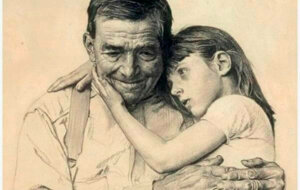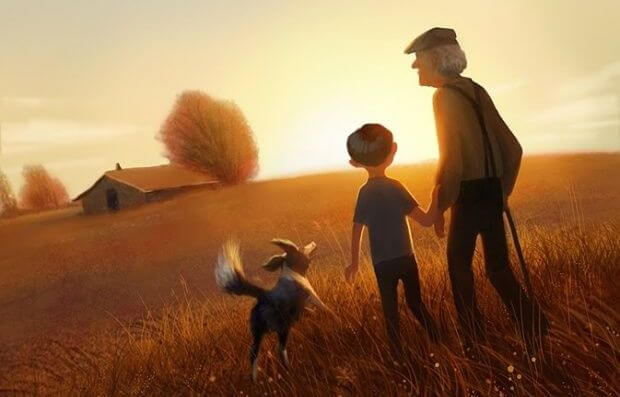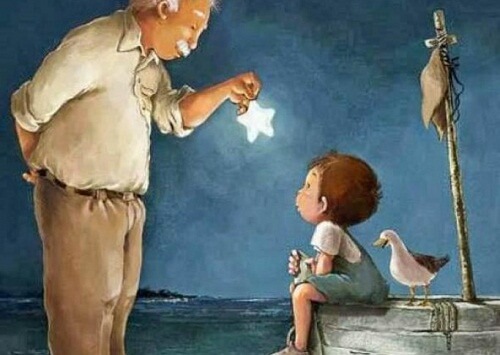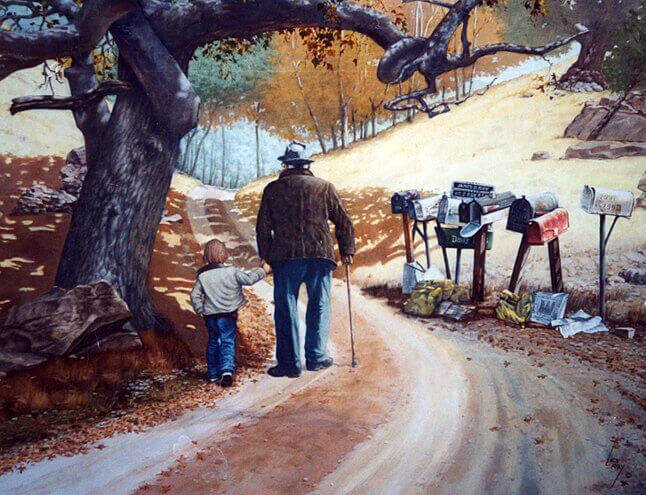Our Grandparents Stay in Our Hearts Forever


Written and verified by the psychologist Sergio De Dios González
Grandparents never really die, they stay in our hearts forever. Even today we miss them and would give anything to hear their stories again, feel their hugs, and see their tender and loving looks.
However, life has its own rules and, while grandparents have the privilege of seeing us born and grow, we have to witness them growing old and, ultimately, saying goodbye to the world. As a matter of fact, their loss is usually the first we have to experience in our childhood.
Grandparents who are involved in raising their grandchildren leave traces in their souls. In fact, their legacies accompany their grandchildren for life.
Nowadays, it’s extremely common to see grandparents involved in parenting tasks with their grandchildren. They provide an invaluable support network. Nevertheless, their role isn’t the same as that of a mother or father. This is something that children sense from an early age.
The bond between grandparents and grandchildren is created from a far more intimate and deep kind of complicity, Therefore, their loss can, in many cases, be a sensitive subject for a child or an adolescent. Let’s take a closer look.

Our first experience with loss
Some have the privilege of having one of their grandparents around into adulthood. On the other hand, many have to face their death in early childhood, at the age when they still don’t really understand loss. Furthermore, adults sometimes explain it rather poorly, trying to sweeten the idea of death and pain.
However, most educational psychologists agree that a child should always be told the truth. Of course, the message should be adapted to their age, but parents shouldn’t make the mistake of not allowing them to visit a grandparent in the hospital to say goodbye. Nor should they use metaphors such as “Grandpa’s a star in the sky now” to explain their death.
Death should be explained to children in a simple way and without metaphors so that they don’t get the wrong idea. For example, if they’re told that Grandpa is gone, they’ll most likely ask when he’s coming back.
Regardless of whether death is explained to a child from a religious point of view or not, the fact must be emphasized that the deceased person won’t be coming back. It must also be remembered that young children can only absorb limited amounts of information. For this reason, explanations should be as short and simple as possible.
A necessary pain

It’s also important to keep in mind the fact that death isn’t taboo and the tears of adults don’t have to be hidden from the eyes of children. We all suffer the loss of loved ones and we should talk about our losses and vent our feelings. Our children will also need to do this and we should make it easy for them to do so.
Children will always ask many questions that require the most patient and appropriate answers. The loss of grandparents in childhood or adolescence is always complex. For this reason, the family should go through the mourning process together, being attentive to any particular needs of the children.
They’re always here
Grandparents, even if they’re not here, are still very present in our lives. We speak about them at our family get-togethers and we pass information about them onto the new generations in our family. To the new grandchildren or great-grandchildren who never had the chance to meet their grandparents.
The grandparents held our hands for a time when they taught us to walk. Now they’re held in our hearts eternally, lighting our way, forever in our thoughts.
Their presences still live in those faded photographs we keep in frames, not on our cellphones. Grandpa is in that tree that he planted, Grandma is in that dress she made for us and that we still treasure. Whenever we smell cookies baking, like Grandma used to make, it sparks our emotional memory.
Their memory is also in each piece of advice they gave us, and the stories they told us. They’re even in the way we tie our shoes and that dimple in our chin or blue eyes we inherited from them.
They’ll be with us all our lives

Grandparents never die because they’re inscribed in our emotions in a far more intricate and profound way than simple genetics. They taught us to go a little slower and at their own pace, to savor an afternoon in the countryside, to discover that good books have a special smell. Their language went far beyond words.
Theirs was the language of a hug, a caress, and a complicit smile. It was a mid-afternoon walk, where we shared the silence and watched the sunset. All of this will last forever in the legacy they left behind. They truly loved us and we remember them every day.
Grandparents never really die, they stay in our hearts forever. Even today we miss them and would give anything to hear their stories again, feel their hugs, and see their tender and loving looks.
However, life has its own rules and, while grandparents have the privilege of seeing us born and grow, we have to witness them growing old and, ultimately, saying goodbye to the world. As a matter of fact, their loss is usually the first we have to experience in our childhood.
Grandparents who are involved in raising their grandchildren leave traces in their souls. In fact, their legacies accompany their grandchildren for life.
Nowadays, it’s extremely common to see grandparents involved in parenting tasks with their grandchildren. They provide an invaluable support network. Nevertheless, their role isn’t the same as that of a mother or father. This is something that children sense from an early age.
The bond between grandparents and grandchildren is created from a far more intimate and deep kind of complicity, Therefore, their loss can, in many cases, be a sensitive subject for a child or an adolescent. Let’s take a closer look.

Our first experience with loss
Some have the privilege of having one of their grandparents around into adulthood. On the other hand, many have to face their death in early childhood, at the age when they still don’t really understand loss. Furthermore, adults sometimes explain it rather poorly, trying to sweeten the idea of death and pain.
However, most educational psychologists agree that a child should always be told the truth. Of course, the message should be adapted to their age, but parents shouldn’t make the mistake of not allowing them to visit a grandparent in the hospital to say goodbye. Nor should they use metaphors such as “Grandpa’s a star in the sky now” to explain their death.
Death should be explained to children in a simple way and without metaphors so that they don’t get the wrong idea. For example, if they’re told that Grandpa is gone, they’ll most likely ask when he’s coming back.
Regardless of whether death is explained to a child from a religious point of view or not, the fact must be emphasized that the deceased person won’t be coming back. It must also be remembered that young children can only absorb limited amounts of information. For this reason, explanations should be as short and simple as possible.
A necessary pain

It’s also important to keep in mind the fact that death isn’t taboo and the tears of adults don’t have to be hidden from the eyes of children. We all suffer the loss of loved ones and we should talk about our losses and vent our feelings. Our children will also need to do this and we should make it easy for them to do so.
Children will always ask many questions that require the most patient and appropriate answers. The loss of grandparents in childhood or adolescence is always complex. For this reason, the family should go through the mourning process together, being attentive to any particular needs of the children.
They’re always here
Grandparents, even if they’re not here, are still very present in our lives. We speak about them at our family get-togethers and we pass information about them onto the new generations in our family. To the new grandchildren or great-grandchildren who never had the chance to meet their grandparents.
The grandparents held our hands for a time when they taught us to walk. Now they’re held in our hearts eternally, lighting our way, forever in our thoughts.
Their presences still live in those faded photographs we keep in frames, not on our cellphones. Grandpa is in that tree that he planted, Grandma is in that dress she made for us and that we still treasure. Whenever we smell cookies baking, like Grandma used to make, it sparks our emotional memory.
Their memory is also in each piece of advice they gave us, and the stories they told us. They’re even in the way we tie our shoes and that dimple in our chin or blue eyes we inherited from them.
They’ll be with us all our lives

Grandparents never die because they’re inscribed in our emotions in a far more intricate and profound way than simple genetics. They taught us to go a little slower and at their own pace, to savor an afternoon in the countryside, to discover that good books have a special smell. Their language went far beyond words.
Theirs was the language of a hug, a caress, and a complicit smile. It was a mid-afternoon walk, where we shared the silence and watched the sunset. All of this will last forever in the legacy they left behind. They truly loved us and we remember them every day.
This text is provided for informational purposes only and does not replace consultation with a professional. If in doubt, consult your specialist.







